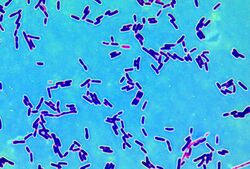Biology:Lactobacillus plantarum PS128
Lactobacillus plantarum PS128 is a specific strain of Lactobacillus plantarum, a bacterium of the genus Lactobacillus. It won "Probiotic Product of the Year" at the 2018 NutraingredientsAsia Awards.[1]
Lactobacillus plantarum is a diverse species of lactic bacterium found in a wide range of ecological niches including plant substrates, meat, milk, as well as in the gastrointestinal tract of humans. Lactic bacteria are gram-positive, oxygen-tolerant anaerobes that have been used in food fermentation for hundreds of years.[2]
Microbiome-Gut-Brain Axis
The human body is composed of a complex biological system with over 10 million microbiota genes (microbiome) and possesses over 100 trillion bacteria, 1,000 species and over 7,000 strains. The intestinal tract is the most abundantly colonized area, with a bacterial concentration ranging from 10 to 1,000 bacteria per gram at the top of the intestinal tract, to 1011-1012 bacteria per gram in the colon, of which Firmicutes and Bacteroidetes represent the main phyla.[3]
The gut microbiota interacts with the host through the immune system, the neuroendocrine system and neural pathways. These pathways are components of the microbiota-gut-brain axis, the complex two-way communication system between the central and enteric nervous system, which connects the emotional and cognitive centers of the brain with peripheral intestinal functions. The relationship between the brain, gut and gut microbiota begins during perinatal development and persists throughout life.[4]
Psychobiotics
Modulation of the gut-brain axis is increasingly being proposed as a target of new treatments for a wide variety of disorders, such as irritable bowel syndrome and immune disorders, and more recently for CNS pathologies such as anxiety, depression, autism, and neurodevelopmental disorders.[5] "Psychobiotics" are a class of probiotics first coined by Dinan et al. in 2013, which "confer mental health benefits through interactions with commensal gut bacteria."[6] These bacteria are able to produce or induce the production of neurotransmitters, such as GABA, dopamine and serotonin, which act on the gut-brain axis. Evidence suggests modulation of these hormones can have anti-anxiety or antidepressant effects.[7]
L. plantarum PS128 reportedly can increase dopamine and serotonin levels in the brain. Multiple clinical studies have tested its effect on autism,[8] Parkinson's,[9] and other neurological disorders.
Safety
Lactobacillus plantarum is "generally recognized as safe" (GRAS) status[10] and included in the "qualified presumption of safety" (QPS) list of the European Food Safety Authority (EFSA).[11]
Products
In Europe, CNS pharmaceutical company Neuraxpharm, markets a product for autism containing PS128.[12] Synergia sells in the probiotic in France.
Solace and Thryve are brands containing PS128 in North America.
In Malaysia, Nuvanta sells a PS128 product.[13]
In 2020, Blackmores, an Australian health supplements company, announced plans to develop a PS128 product for the Australia/New Zealand market.[14]
References
- ↑ nutraingredients-asia.com. "Use your head, follow your gut: Bened Biomedical's award-winning probiotic product set for market expansion" (in en-GB). https://www.nutraingredients-asia.com/Article/2018/09/17/Use-your-head-follow-your-gut-Bened-Biomedical-s-award-winning-probiotic-product-set-for-market-expansion.
- ↑ Behera, Sudhanshu S.; Ray, Ramesh C.; Zdolec, Nevijo (2018-05-28). "Lactobacillus plantarum with Functional Properties: An Approach to Increase Safety and Shelf-Life of Fermented Foods". BioMed Research International 2018: 1–18. doi:10.1155/2018/9361614. ISSN 2314-6133. PMID 29998137.
- ↑ Liu, Lu; Zhu, Gang (2018-05-29). "Gut–Brain Axis and Mood Disorder". Frontiers in Psychiatry 9: 223. doi:10.3389/fpsyt.2018.00223. ISSN 1664-0640. PMID 29896129.
- ↑ Kelly, John R.; Clarke, Gerard; Cryan, John F.; Dinan, Timothy G. (May 2016). "Brain-gut-microbiota axis: challenges for translation in psychiatry". Annals of Epidemiology 26 (5): 366–372. doi:10.1016/j.annepidem.2016.02.008. ISSN 1047-2797. PMID 27005587. http://dx.doi.org/10.1016/j.annepidem.2016.02.008.
- ↑ Borre, Yuliya E.; O’Keeffe, Gerard W.; Clarke, Gerard; Stanton, Catherine; Dinan, Timothy G.; Cryan, John F. (September 2014). "Microbiota and neurodevelopmental windows: implications for brain disorders". Trends in Molecular Medicine 20 (9): 509–518. doi:10.1016/j.molmed.2014.05.002. ISSN 1471-4914. PMID 24956966. http://dx.doi.org/10.1016/j.molmed.2014.05.002.
- ↑ Sarkar, Amar; Lehto, Soili M.; Harty, Siobhán; Dinan, Timothy G.; Cryan, John F.; Burnet, Philip W.J. (November 2016). "Psychobiotics and the Manipulation of Bacteria–Gut–Brain Signals". Trends in Neurosciences 39 (11): 763–781. doi:10.1016/j.tins.2016.09.002. ISSN 0166-2236. PMID 27793434.
- ↑ Dinan, Timothy G.; Stanton, Catherine; Cryan, John F. (November 2013). "Psychobiotics: A Novel Class of Psychotropic" (in en). Biological Psychiatry 74 (10): 720–726. doi:10.1016/j.biopsych.2013.05.001. PMID 23759244. https://linkinghub.elsevier.com/retrieve/pii/S0006322313004083.
- ↑ Ltd, Bened Biomedical Co. "Bened Biomedical Co., Ltd.: Psychobiotic PS128(TM) found to be a potential solution for Autism Spectrum Disorder (ASD) and Attention Deficit Hyperactivity Disorder (ADHD)" (in en). https://www.prnewswire.com/news-releases/bened-biomedical-co-ltd-psychobiotic-ps128tm-found-to-be-a-potential-solution-for-autism-spectrum-disorder-asd-and-attention-deficit-hyperactivity-disorder-adhd-300855678.html.
- ↑ Ltd, Bened Biomedical Co. "Psychobiotic PS128 consumption shows benefits to Parkinson's symptoms in new clinical study" (in en). https://www.prnewswire.com/news-releases/psychobiotic-ps128-consumption-shows-benefits-to-parkinsons-symptoms-in-new-clinical-study-301231470.html.
- ↑ Nutrition, Center for Food Safety and Applied (2020-08-04). "Generally Recognized as Safe (GRAS)" (in en). https://www.fda.gov/food/food-ingredients-packaging/generally-recognized-safe-gras.
- ↑ Koutsoumanis, Kostas; Allende, Ana; Alvarez‐Ordóñez, Avelino; Bolton, Declan; Bover‐Cid, Sara; Chemaly, Marianne; Davies, Robert; Cesare, Alessandra De et al. (2020). "Update of the list of QPS-recommended biological agents intentionally added to food or feed as notified to EFSA 12: suitability of taxonomic units notified to EFSA until March 2020" (in en). EFSA Journal 18 (7): e06174. doi:10.2903/j.efsa.2020.6174. ISSN 1831-4732. PMID 32760463.
- ↑ "Neuraxpharm launches first probiotic product PS128™" (in en). https://www.neuraxpharm.com/neuraxpharm-launches-first-probiotic-product-ps128-n-30-en.
- ↑ nutraingredients-asia.com. "Psychobiotics in South East Asia: Bened powering through with expansion plans for proprietary ingredient" (in en-GB). https://www.nutraingredients-asia.com/Article/2019/02/12/Psychobiotics-in-South-East-Asia-Bened-powering-through-with-expansion-plans-for-proprietary-ingredient.
- ↑ nutraingredients-asia.com. "Blackmores inks deal with psychobiotic supplier Bened" (in en-GB). https://www.nutraingredients-asia.com/Article/2020/03/24/Blackmores-inks-deal-with-psychobiotic-supplier-Bened.


